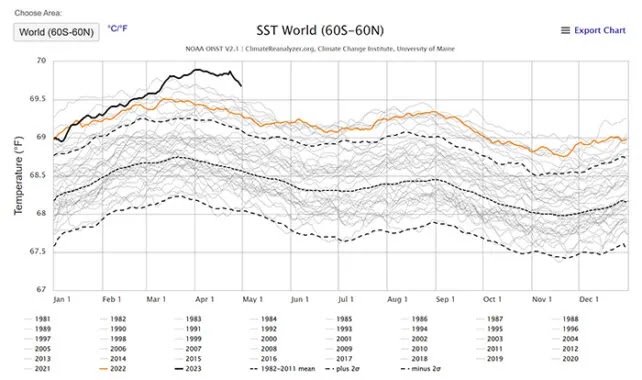According to a new study, sea surface temperatures are rising to new highs and scientists are becoming increasingly concerned about the impact of this trend on marine life and weather patterns around the world. The research, conducted by the National Oceanic and Atmospheric Administration (NOAA), found that sea surface temperatures in the Northeast Pacific Ocean have reached levels not seen in at least 1,000 years.
The study, which was published in the journal Nature, used data from tree rings, ice cores, and other natural sources to create a historical record of sea surface temperatures in the Northeast Pacific dating back to 1000 AD. The researchers found that recent sea surface temperature trends are unprecedented and cannot be explained by natural variability alone.
The warming trend has been particularly strong in the last few decades, with sea surface temperatures in the Northeast Pacific rising at a rate of 0.5 to 1.0 degrees Celsius per century. This rate of warming is much faster than anything seen in the past 1,000 years.
The study's authors suggest that this warming trend is likely to have a significant impact on marine life and ecosystems, as well as weather patterns around the world. They note that warming oceans can lead to the destruction of coral reefs, which provide important habitats for fish and other marine life. Warmer oceans can also lead to the proliferation of harmful algal blooms, which can be toxic to fish and other sea creatures.
In addition to the impact on marine life, the warming trend is also likely to have significant implications for weather patterns around the world. Warmer sea surface temperatures can lead to more intense and frequent hurricanes, as well as changes in precipitation patterns and drought conditions.
Scientists are calling for urgent action to address the issue of rising sea surface temperatures. They say that reducing greenhouse gas emissions is the key to slowing down the warming trend and mitigating its impact on marine life and weather patterns.
The study's lead author, Rosalind Rickaby, a professor of biogeochemistry at the University of Oxford, said in a statement: "This research provides another important piece of evidence that the Earth's climate is changing in unprecedented ways, and that we need to take urgent action to reduce our greenhouse gas emissions and protect our planet's ecosystems."
In conclusion, the rising sea surface temperatures in the Northeast Pacific Ocean are a cause for concern among scientists. The warming trend is likely to have significant impacts on marine life, ecosystems, and weather patterns around the world. Urgent action is needed to reduce greenhouse gas emissions and mitigate the effects of this trend on the environment.
Because global SSTs will only increase as El Niño develops, the oceans may see a horrific 5σ SST massive heating event this year or next.
— Prof. Eliot Jacobson (@EliotJacobson) April 23, 2023
5σ = 1-in-3,490,000.
We're currently at 4.47σ.
Physicists use 5σ anomalies as proof of existence. E.g. Higgs boson.https://t.co/9G6PVnjWeh pic.twitter.com/6PgxMeAcEl



